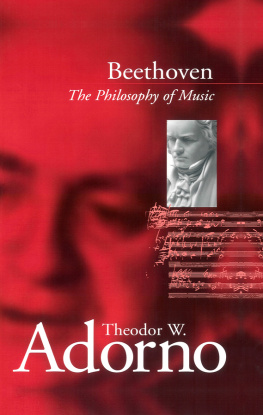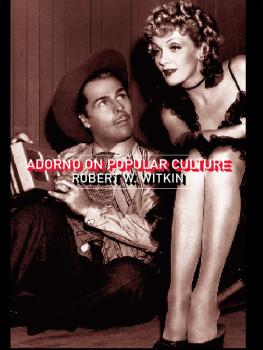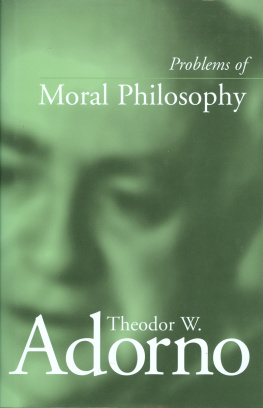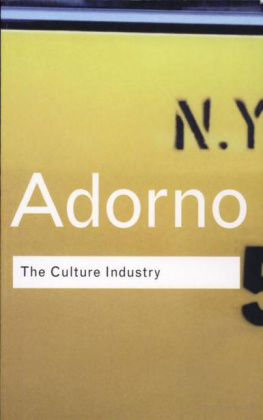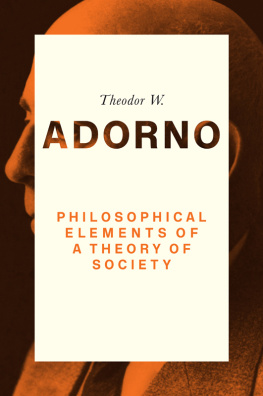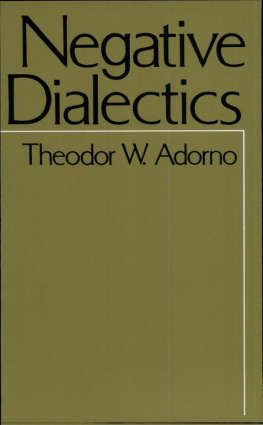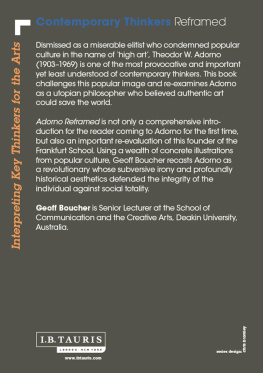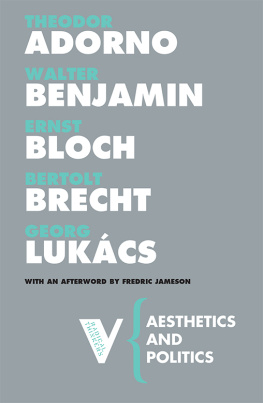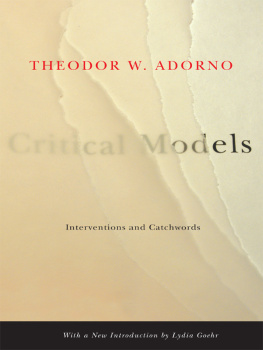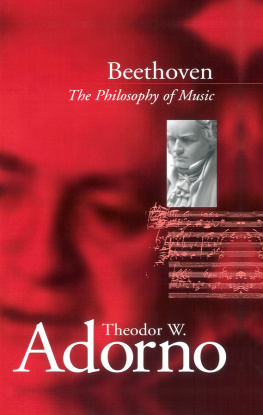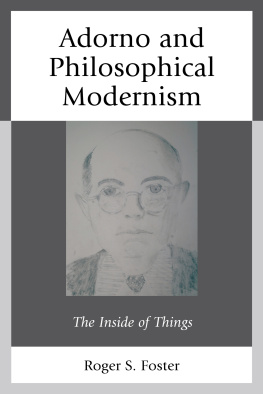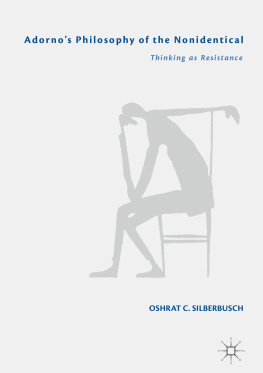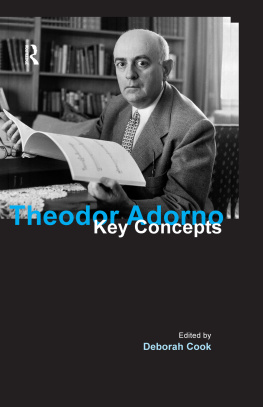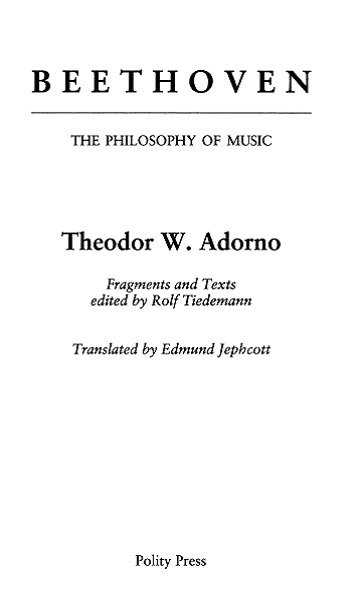
This translation copyright Polity Press 1998
First published in Germany as Beethoven:Philosophie der Musik Suhrkamp Verlag, Frankfurt am Main, 1993.
This translation first published in 1998 by Polity Press in association with Blackwell Publishers, a Blackwell Publishing Company.
Published with the financial support of Inter Nationes, Bonn.
First published in paperback 2002
Reprinted 2005, 2007
Polity Press
65 Bridge Street
Cambridge CB2 1UR, UK
Polity Press
350 Main Street
Maiden, MA 02148, USA
All rights reserved. Except for the quotation of short passages for the purposes of criticism and review, no part of this publication may be reproduced, stored in a retrieval system, or transmitted, in any form or by any means, electronic, mechanical, photocopying, recording or otherwise, without the prior permission of the publisher.
Except in the United States of America, this book is sold subject to the condition that it shall not, by way of trade or otherwise, be lent, re-sold, hired out, or otherwise circulated without the publishers prior consent in any form of binding or cover other than that in which it is published and without a similar condition including this condition being imposed on the subsequent purchaser,
ISBN: 978-0-7456-1467-0
ISBN: 978-0-7456-3045-8 (pbk)
A CIP catalogue record for this book is available from the British Library.
For further information on Polity, visit our website: www.polity.co.uk
EDITORS PREFACE
To great writers, finished works weigh lighter than those fragments on which they work throughout their lives. Benjamins aphorism from One-Way Street sounds as if it had been coined for the book Adorno wanted to write decades later on Beethoven. Adorno pursued one might even say: courted few of his literary projects as long or intensively as this. And none came to a stop, for almost a lifetime, at a similarly early stage of its composition. His first texts on Beethoven were produced, as yet without any idea of writing a book on the composer, in 1934, the second year of the Nazi regime, and shortly before the beginning of his exile. According to Adorno, he planned to write a philosophical work on Beethoven from 1937; the earliest surviving notes for it date from spring or summer 1938, immediately after his move to New York. He seems to have formed the plan after completing the Versuch ber Wagner or even in parallel to it. Two years later, in June 1940, a letter to his parents, mainly about the defeat of France, contains the statement: The next major piece of work I intend to take on will be the Beethoven. The work on Beethoven had actually been started long before, though only in the form of notes on individual compositions and, usually, on isolated aspects of Beethovens music. But the real work, which for Adorno began only with the formulation of the connected text, had not even been started, doubtless because of the daily pressures to which the migr writer was exposed. At the end of 1943 by now Adorno was living in California he was still far from having started to write the book, as emerges from a letter to Rudolf Kolisch. Referring to my long-planned book on Beethoven, Adorno writes: I think it ought to be the first thing I do after the war. But even when the war was over and Adorno was back in Frankfurt-on- Main, he continued to write notes of the kind he had been accumulating more or less continuously since 1938. In 1956, however, these broke off rather abruptly; after that, only a few additions were made. In a letter of July 1957 to the pianist and Beethoven scholar Jrgen Uhde, Adorno remarked wistfully: If only I could get on with writing my book on Beethoven, on which I have copious notes. But heaven alone knows when and whether I shall be able to complete it. In October 1957 Adorno finally wrote the essay Verfremdetes Hauptwerk [The Alienated Magnum Opus] on the Missa Solemnis. After dictating the first draft he wrote in his diary, with quite uncharacteristic emotion: Thank heaven I have done it at last. By this time he had clearly given up hope of completing his Beethoven project. When he included the essay on the Missa Solemnis in the miscellany Moments musicaux in 1964, he referred in the Preface to his projected philosophical work on Beethoven as follows: It has yet to be written, primarily because the authors exertions have foundered continually on the Missa Solemnis. He has therefore attempted, at least, to explain these difficulties, to state the question more clearly, without presuming to have answered it. The hope of solving the problems which not only the Missa but Beethovens music as a whole posed to philosophical interpretation seemed to Adorno increasingly forlorn; but there were times when he entertained it all the same. In an impromptu radio talk on Beethovens late style in 1966, his last work concerned with Beethoven, Adorno no longer mentioned his plan for a book at all. But not long before his death, in January 1969, he included Beethoven. The Philosophy of Music as the last in a series of eight books he still intended to complete. It is hard here to distinguish the gentle irony with which the sixty-five-year-old author committed himself to writing eight more books, from his unshakable belief in his own productivity, which for others was, indeed, hardly imaginable. Up to the end, the work on Beethoven was not written down, nor was its final drafting even begun. The present edition brings together the very numerous preparatory notes for that work, as well as a few completed texts: fragments on which the author worked throughout his life, or at least throughout its most productive phase.
The book now at the readers disposal contains, on the one hand, every word Adorno wrote for his Beethoven study and, on the other, nothing written by anyone else, at least in the text section. All the same, it is not a book by Adorno. It lacks the closed, integrated structure of a completed work; it has remained a fragment. Adornos Beethoven is fragmentary in a far more literal sense than his Aesthetic Theory, for example. If the latter has been aptly called a great fragment it breaks off before the final stage of formulation the fragments in Beethoven are of a lesser kind. They are first drafts which were put aside before Adorno had attempted to combine them into a whole, or had even sketched a plan for the entire work. None of the notes on Beethoven was written for a reader; they were all intended for the author himself, as aides-mmoire for the time when he would apply himself to the final composition, a task he never began. Many of the notes are merely programmatic in nature, hardly more than what Adorno called a formal indication of what he intended to write. And even when, in some cases, individual ideas and motifs go far beyond this stage, they usually trace the path ahead rather than covering the ground itself. Much of the material, which does not go beyond the mere impression or idea, Adorno would never have approved for printing. While he knew what he intended to say, the reader can only surmise it. The reader of the fragments must always bear in mind that Adorno is not speaking directly to the reader. What is only hinted at, sometimes in a private idiom, the reader must translate into a language in which it can be understood by all. The receptive exertion that any text by Adorno demands of its readers is required in potentiated form by the fragments presented here.

